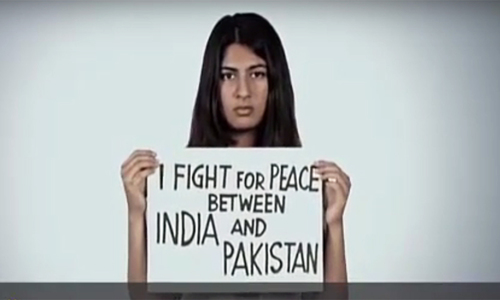
TRY this one for a conspiracy theory. Two months ago, on July 8 to be precise, the Indians did something stupid in the Valley: they killed Burhan Wani.
Stupid not because Pakistan says so, but because many Indians themselves did: killing a charismatic 22-year-old who had stirred up Kashmiris was a recipe for unrest.
And unrest is what India got. An own goal had been scored.
What happened next was also fairly predictable: India went into repression mode. Compounding the original error, it used disproportionate violence against civilians and made a mess of things there.
Curfew was imposed. The state of India was sucked back into a familiar cycle of repression and violence in held Kashmir. The people wouldn’t back down; the state wouldn’t relent.
All right, but where’s the conspiracy theory, you’re wondering.
The state of India had an advantage that the people of Kashmir didn’t: much of India didn’t care about the violence and the outside world sure as heck didn’t — contrary to what we were being told here in Pakistan.
Sure, the human rights lot and the Kashmiri diaspora had shone a light on abuse and repression by Indian security forces and that had started to attract international media attention at the fringes, but it was nothing remotely alarming for India.
If Uri was not done by non-state Pakistani militants, then India has managed an even more spectacular own goal.
As for Pakistan’s efforts to internationalise the issue, the derision with which the parliamentary junkets to foreign capitals was met with pretty much summed up the effort: desultory, weak and embarrassing.
Now, look away if you’re easily disorientated by theories other than what the state propagates.
Two months of unrest in reaction to Indian repression had created a dilemma for the anti-India non-states here.
India was getting away with murder, literally, and India wasn’t being forced to pay. Violence in response to violence is the non-states raison d’être.
What the hell kind of jihadi outfit are you if you don’t act when India is on the rampage against Kashmiris?
And violence by the Indian state is also a recruiting tool, especially if you can amp up the outrage here in Pakistan at Indian atrocities against Kashmiris.
Plus, the world’s attention needed to be focused and there’s only one way for the world’s attention to focus on Pakistan and India: the threat of war.
Put all of that together and you have the makings of a spectacular attack.
Like, y’know, Uri.
That’s madness, you’re thinking. A two-bit conspiracy theory. What the hell was the advantage to Pakistan?
Even well-meaning folk here have had trouble digesting the possibility. But then they also have long had trouble digesting the value of non-states to begin with.
There is, of course, a straightforward way to separate conspiracy from fact. The Uri attackers were either Pakistani or they were not.
India has the bodies and those bodies are tied to families, handlers and networks that exist either here or over there. Identification is not only possible it is inevitable.
And you can bet the Indian and Pakistani intelligence apparatuses — and probably of a handful of other countries — already know the attackers’ identities.
Attacks and their aftermath usually unleash a torrent of intelligence that is impossible to miss.
Handlers have to coordinate. The families have to mourn their dead. The networks have to eulogise the act. Fellow jihadis have to dissect the operation and marvel at their brethren’s bravery and success.
If Uri was not done by Pakistanis, then India has managed an even more spectacular own goal. It would mean a new generation of armed and trained insurgents to contend with.
And it would mean that India’s raging against Pakistan has drawn the world’s attention, however briefly, towards what India is doing to Kashmiris.
But if Uri was done by Pakistani non-states…
In truth, it would be more depressing than frightening. Not frightening in a peculiar Pak-India sense because already we’ve shown that we can get away with it.
Because what, really, can India do about it? A rageful India can threaten war, but that only brings the outside world rushing in to counsel peace.
Plus, in a hard-nosed way, would India go to war with Pakistan — a Pakistan with an explicitly lowered nuclear threshold — over a handful of dead soldiers and citizens?
As India rises, a two-and-a-half-trillion dollar economy paired with global ambitions, its pain threshold will also rise — what is worth losing all of that over will become progressively higher in the next decade or so.
And if India does decide to double-down on stirring up mischief inside Pakistan, nothing like it. Few things would enthuse the boys here more than hunting down some India-lovers doing harm to the homeland.
The counterterrorism infrastructure is anyway in full-blown expansion mode because of the fight against the anti-Pak militants. And an endless war would extend the boys’ internal predominance.
So not really that frightening in the peculiar way that is India-Pak.
But depressing because of the circularity of it all. A security state with an insecure worldview. An India obsession that is fed by India’s own antics.
A Kashmir dispute that we refuse to be pragmatic about and which India gives us a reason to not be pragmatic about.
A democratic transition too weak for the civilians to influence foreign policy or national security, but weak enough to not invite a military takeover that could place a peace-making general at the helm.
So, yeah, God bless the Kashmiris. Fire and brimstone on the Indians. But feel sorrow for Pakistan and Pakistanis — you and me, the regular folk.
Conspiracy theories or facts, all we have is the knowledge that, either way, we get hurt.
The writer is a member of staff.
Twitter: @cyalm
Published in Dawn September 25th, 2016

















































